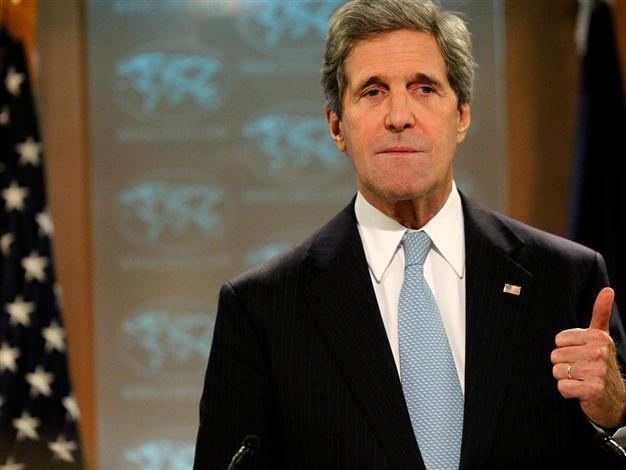US human rights report criticizes Turkey's judicial system, notes progress on cultural rights
ISTANBUL

ecretary of State John Kerry gestures as he speaks at the State Department in Washington, April 19, where he released the 2012 Country Reports on Human Rights Practices. AP photo
The U.S. State Department has expressed criticism on the human rights situation in Turkey, while noting some progress, especially regarding cultural rights, in its annual report assessing human rights around the world released April 19.
The 2012 report details in 48 pages some of the cases that have recently caused debate. According to the report, the main problems that Turkey faces on the human rights agenda are deficiencies in access to justice and government interference with freedom of expression.
U.S. Secretary of State John Kerry said the administration had debated whether to postpone the release of the report due to the Boston bombings. “But we thought that, on the contrary, it’s a part of human rights to make clear that people have the right to run in a marathon without violence, and that people have a right to enjoy a holiday without terror, and that the rights of people are represented in many different ways,” he said, a day before traveling to Istanbul for the Friends of Syria core group meeting.
Kerry emphasized that the U.S. administration was committed to voicing its concerns on human rights about any country in the world. “These reports are thorough, they’re honest. And they need to be, because our policies are grounded in a clear-eyed assessment of governments as they are, not how they want to be or how they pretend to be,” he said.
“Journalists, academics and writers … were afraid that criticizing the state or government publicly could result in civil or criminal suits or investigations, ” the report said, noting that political leaders, including the prime minister, had sued their critics for defamation. It also mentioned that many students had been charged under anti-terror laws for participating in legal demonstrations.
The report also found that the Turkish government had failed to protect “vulnerable populations” adequately, particularly LGBT individuals. Violence against women also remains a critical issue, despite progress made with a new domestic violence law, it said.
The report criticized the excessive force used by security forces during demonstrations, adding that the number of prosecutions regarding abuses by the security forces remained very low, despite some investigations.
Progress on cultural rights
However, the report did note some improvements that have occurred following the adoption of the third judicial package on July 2012. “Approximately 20,000 persons were released from jail because of Third Judicial Package reforms regarding releases pending trial or the redefinition of crimes,” it said.
It also emphasized progress made on cultural rights, particularly citing the conditions of the Roma community as well as the use of minorities' mother tongues. “Sabro, the first Assyrian newspaper in Turkey, started a monthly publication in March. The Diyarbakır City Theater performed Shakespeare’s Hamlet in Kurdish in a tour around Turkey, most notably at the Ankara State Theater on Nov. 26 with the minister of culture in attendance,” the report stated.
Click here to access the full U.S. State Department report on Turkey.
















